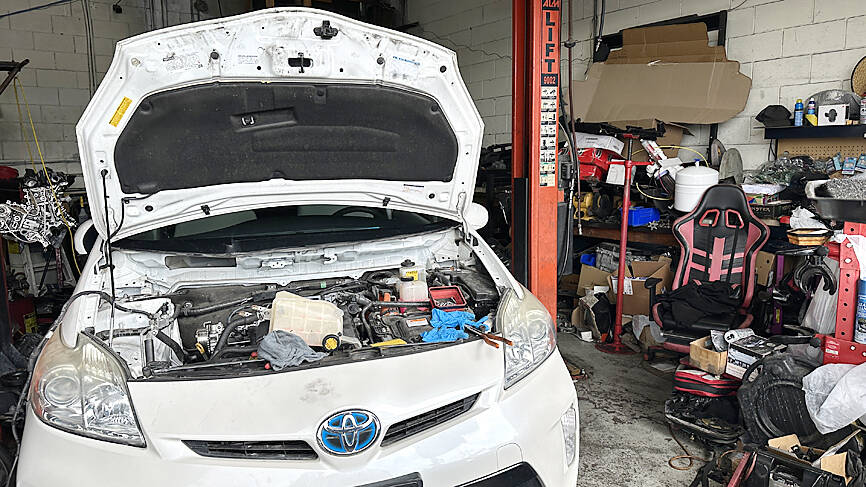Taiwanese auto part suppliers are considering the possibility of rolling out products in the US after US President Donald Trump slapped a 25 percent tariff on foreign-made auto parts overnight, but remain concerned about their bottom line given the unavoidable increase in operating costs.
Tong Yang Group (東陽), which produces plastics, sheet metal parts and cooling devices used in vehicles, said it would continue to expand production in the US.
It has had production lines in the US for more than three decades, the company added.

Photo: CNA
However, Tong Yang admitted higher production costs would push up prices not only for auto parts, but also for finished automobiles in the US market.
The comments came after Trump announced on Wednesday that a 25 percent tariff on parts imported to the US market would come into effect on May 3, while a 25 percent tariff on automobiles goes into effect immediately. The levies are part of Trump’s fresh round of tariffs in which Taiwan faces 32 percent in reciprocal tariffs.
An executive from a car multimedia equipment supplier said that many original equipment makers for car production operate facilities in Canada or Mexico, which allows them to enjoy tariff exemptions under the US-Mexico-Canada Agreement, but Trump’s 25 percent tariffs are expected to speed up the pace at which they invest in the US, he said.
However, the executive raised concerns about a lack of laborers and high labor costs in the US.
Although auto parts suppliers could take advantage of automation to ease the impact of a labor shortage, high production costs are inevitable, he said.
Hushan Autoparts Inc (虎山), a door handle maker which is observing the possible impact of Trump’s actions, said the new tariffs, which would boost product prices, are likely to reduce demand for auto parts, as consumers could postpone their maintenance needs or seek aftermarket components made by third-party producers other than the original equipment manufacturers.
The global auto industry has suffered a shortage of original components, and some US insurers such as State Farm tend to use aftermarket parts with certification from the Certified Automotive Parts Association as a way to boost demand for aftermarket components, Tong Yang said.
According to the Taiwan Transportation Vehicle Manufacturers Association (台灣車輛公會), several US insurers favor aftermarket components made by Taiwanese suppliers, which are more affordable, but the quality is the equivalent of original equipment items.
Taiwan’s aftermarket products could help US consumers cut spending, while the products ensure service quality as well as transportation security, the association said.
The association said it regrets Trump’s latest tariffs, as the levy is expected to affect Taiwanese auto part makers and the tariffs fail to reflect Taiwan’s entire tariff reality.
The 25 percent tariff is expected to boost maintenance costs and insurance compensation spending, and eventually hurt consumers, it said, urging Washington to maintain the current tariff level of 2.5 percent.

BYPASSING CHINA TARIFFS: In the first five months of this year, Foxconn sent US$4.4bn of iPhones to the US from India, compared with US$3.7bn in the whole of last year Nearly all the iPhones exported by Foxconn Technology Group (富士康科技集團) from India went to the US between March and last month, customs data showed, far above last year’s average of 50 percent and a clear sign of Apple Inc’s efforts to bypass high US tariffs imposed on China. The numbers, being reported by Reuters for the first time, show that Apple has realigned its India exports to almost exclusively serve the US market, when previously the devices were more widely distributed to nations including the Netherlands and the Czech Republic. During March to last month, Foxconn, known as Hon Hai Precision Industry

Taiwan Semiconductor Manufacturing Co (TSMC, 台積電) and the University of Tokyo (UTokyo) yesterday announced the launch of the TSMC-UTokyo Lab to promote advanced semiconductor research, education and talent development. The lab is TSMC’s first laboratory collaboration with a university outside Taiwan, the company said in a statement. The lab would leverage “the extensive knowledge, experience, and creativity” of both institutions, the company said. It is located in the Asano Section of UTokyo’s Hongo, Tokyo, campus and would be managed by UTokyo faculty, guided by directors from UTokyo and TSMC, the company said. TSMC began working with UTokyo in 2019, resulting in 21 research projects,

Ashton Hall’s morning routine involves dunking his head in iced Saratoga Spring Water. For the company that sells the bottled water — Hall’s brand of choice for drinking, brushing his teeth and submerging himself — that is fantastic news. “We’re so thankful to this incredible fitness influencer called Ashton Hall,” Saratoga owner Primo Brands Corp’s CEO Robbert Rietbroek said on an earnings call after Hall’s morning routine video went viral. “He really helped put our brand on the map.” Primo Brands, which was not affiliated with Hall when he made his video, is among the increasing number of companies benefiting from influencer

Quanta Computer Inc (廣達) chairman Barry Lam (林百里) yesterday expressed a downbeat view about the prospects of humanoid robots, given high manufacturing costs and a lack of target customers. Despite rising demand and high expectations for humanoid robots, high research-and-development costs and uncertain profitability remain major concerns, Lam told reporters following the company’s annual shareholders’ meeting in Taoyuan. “Since it seems a bit unworthy to use such high-cost robots to do household chores, I believe robots designed for specific purposes would be more valuable and present a better business opportunity,” Lam said Instead of investing in humanoid robots, Quanta has opted to invest